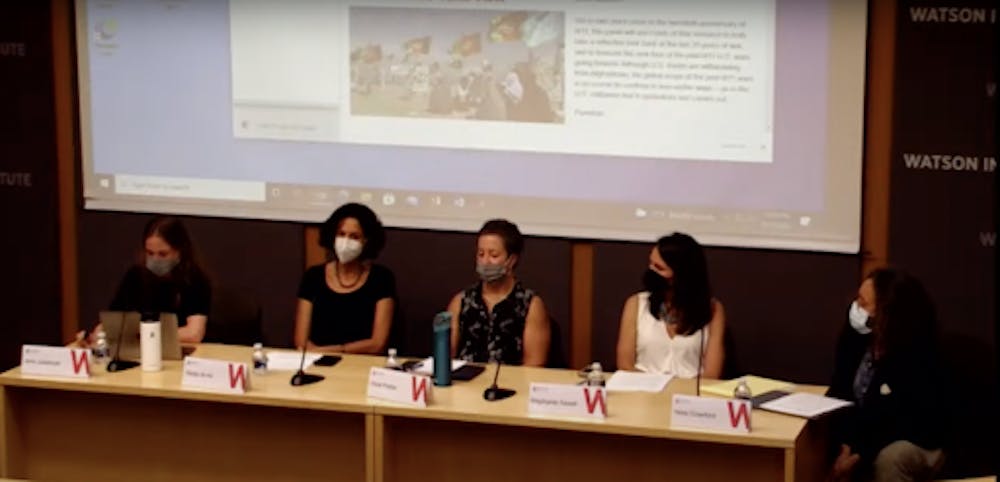Over 20 years after the attack, researchers are still unpacking the effect of 9/11 on U.S. foreign conflicts and the human lives they affect.
“What would it mean for the U.S. to win the war that has no boundaries?” asked Ieva Jusionyte, moderator of “The Past, Present, and Future of the U.S. Post-9/11 Wars: A 20-Year View,” a four-person panel discussion held by the Watson Institute Sept. 15.
Led by Jusionyte, a Watson Family associate professor of International Security and Anthropology, panelists discussed research from the Costs of War Project, which has worked to provide data and analysis of the costs and consequences of the post-9/11 U.S. wars.
Jusionyte began the event by narrating the opening lines to author Viet Thanh Nguyen’s book, Nothing Ever Dies. “All wars are fought twice: the first time on the battlefield, the second time in memory,” she quoted. She added: “We’re writing and re-writing the narrative of the war on terror, counting bodies and dollars, quite uncertain whether it is accurate to say that this war is over, that it is now history.”
Nena Crawford, co-director and co-founder of Costs of War and professor and chair of Political Science at Boston University, said that an underlying sentiment of fear among Americans fueled a reactionary policy response, “institutionalized in the Patriot Act, in the authorization for the use of military force, in this system of preventive war … all of it due to fear,” Crawford said.
Discussing the costs of the war in Iraq, Nadje Al-Ali, director for the Center for Middle East Studies and professor of Anthropology and Middle East Studies at the Watson Institute, said Iraq had already been “decimated radically” through “thirteen years of the most comprehensive sanction system ever imposed on a country” by the time the U.S. invaded.
There was not enough of a focus on the impacts of dehumanization during the Iraq War, Al-Ali said, emphasizing how past political decisions related to this war failed to properly account for human cost.
Heidi Peltier, director of a Costs of War research series and research professor at Boston University’s Frederick S. Pardee Center for the Study of the Longer-Range Future, elaborated on federal military spending.
“If you look at the discretionary budget … the part of the budget that Congress makes decisions about each year … about half of it is for the Department of Defense,” Peltier said. She added that around “two-thirds” of the overall budget is funneled toward causes related to the military while other organizations like the Department of State or Environmental Protection Agency are awarded just a fraction.
Federal funding could have alternatively benefited areas like infrastructure, health care education and green growth in place of U.S. military spending on post-9/11 wars, according to Peltier.
The panel ended examining the present. When speaking about the security policies of the Biden administration, Stephanie Savell, co-director of Costs of War and senior researcher at the Watson Institute, said that the “doctrine of preventive war” characteristic of previous administrations post-9/11 “remains untouched” — a grim reminder of the slow pace of progress, according to the panelists.
Jack Tajmajer was a Metro editor at The Herald.





